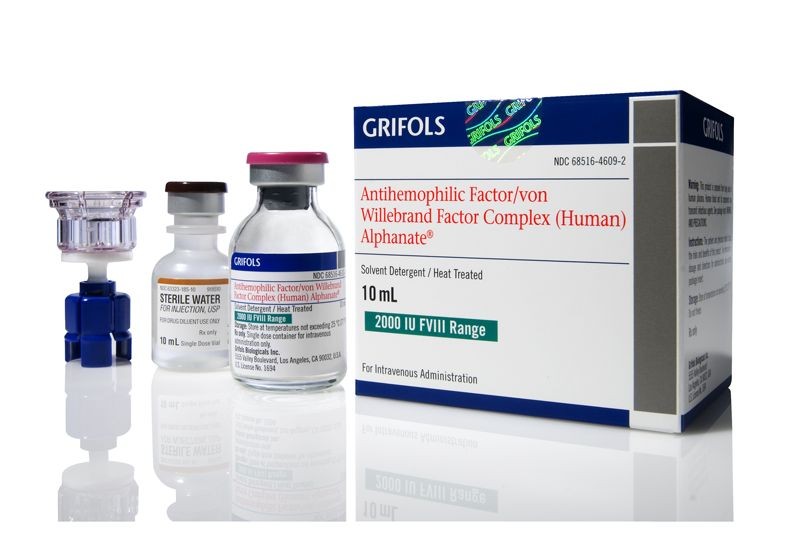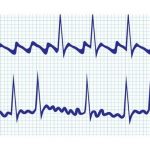
Alphanate: Control and Prevent Bleeding Episodes with antihemophilic factor (factor VIII), human – Injection
Medication Uses
How To Use
Side Effects
Precautions
Drug Interactions
Overdose
Notes
Missed Dose
Storage
USES: This medication controls and prevents bleeding episodes in people with low levels of factor VIII (hemophilia A). It is also used before surgery to prevent bleeding. People with low factor VIII levels are at risk for bleeding longer after an injury/surgery and for bleeding inside the body (especially into the joints and muscles). This product contains human factor VIII, also called antihemophilic factor. It temporarily replaces the missing factor VIII, a protein (clotting factor) in the blood, allowing it to clot and stop bleeding.
HOW TO USE: This medication is injected into a vein over 5 to 10 minutes or as directed by your doctor. The injection may be given more slowly depending on your dose and response. Some patients may be able to self-administer this medication at home after receiving it in a hemophilia treatment center or hospital. If instructed to use this medication at home, read the product information from your pharmacist before starting and each time you refill. Learn the preparation and usage instructions in the product package. If you have any questions, ask your healthcare professional. Bring the refrigerated medication and solution to room temperature before mixing. After adding the solution to the powder, gently swirl the vial to dissolve the powder. Check the solution for particles or discoloration before using. If present, do not use the liquid. Use immediately. The dosage is based on your medical condition, weight, blood test results, and response to treatment. Follow your doctor’s instructions closely. Learn proper needle and medical supply storage and disposal from your pharmacist. Inform your doctor if your condition does not improve or worsens.
SIDE EFFECTS: Possible side effects include flushing of the face, nausea, vomiting, and fast heartbeat. These can be minimized by administering the medication more slowly. Other possible side effects include burning/redness/irritation at the injection site, fever, chills, and headache. If any of these effects persist or worsen, inform your doctor or pharmacist. Remember that the benefits of this medication outweigh the risks of side effects. Serious but rare side effects include signs of anemia, new or worsening bleeding/bruising, and allergic reactions. Seek immediate medical attention if you experience symptoms such as rash, itching/swelling, severe dizziness, trouble breathing, or chest discomfort/tightness. This is not a complete list of side effects. Contact your doctor or pharmacist to report any other effects.
PRECAUTIONS: Inform your doctor or pharmacist if you are allergic to any antihemophilic factor (factor VIII) products, animal proteins, natural rubber/latex, or if you have any other allergies. This product may contain inactive ingredients that can cause allergic reactions or other problems. Consult your pharmacist for more information. Manufacturers of some brands recommend monitoring your heartbeat during treatment and adjusting the administration if necessary. Due to the small risk of infections, it is recommended that you receive appropriate vaccinations and handle the medication with caution to prevent virus infections. Discuss with your doctor before using this medication during pregnancy or breastfeeding. Consult your doctor or pharmacist for a complete list of drug interactions. Keep a list of all medications you use and share it with your healthcare providers.
OVERDOSE: In case of suspected overdose, contact a poison control center or emergency room immediately. US residents can call their local poison control center at 1-800-222-1222. Canadian residents can call a provincial poison control center.
NOTES: Do not share this medication with others. Frequent laboratory blood tests should be performed to determine your dosage and check the effectiveness of the medication.
MISSED DOSE: Follow your doctor’s dosing schedule. If you miss a dose, contact your doctor to establish a new schedule. Do not double the dose.
STORAGE: Store the medication as directed by the manufacturer. Some brands have a limited shelf life at room temperature. Do not freeze or store in the bathroom. Protect from light. Use mixed solution within 3 hours. Discard any unused portion. Properly discard expired or unneeded medication. Consult your pharmacist or local waste disposal company for proper disposal instructions.
MEDICAL ALERT: Your condition can cause complications in a medical emergency. For information about enrolling in MedicAlert, call 1-888-633-4298 (US) or 1-800-668-1507 (Canada). Information last revised August 2013. Copyright(c) 2013 First Databank, Inc.


